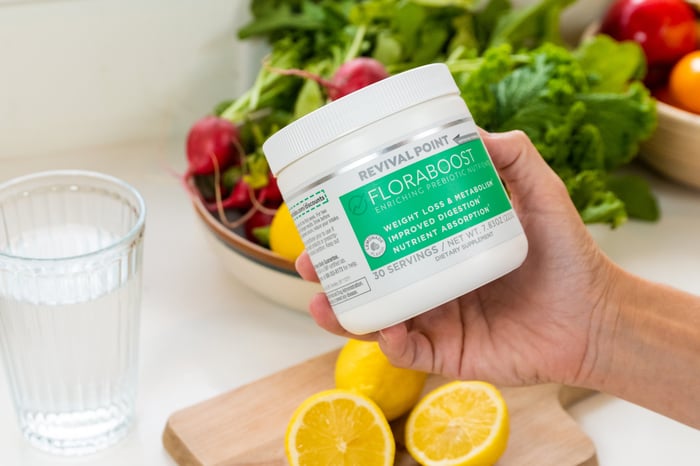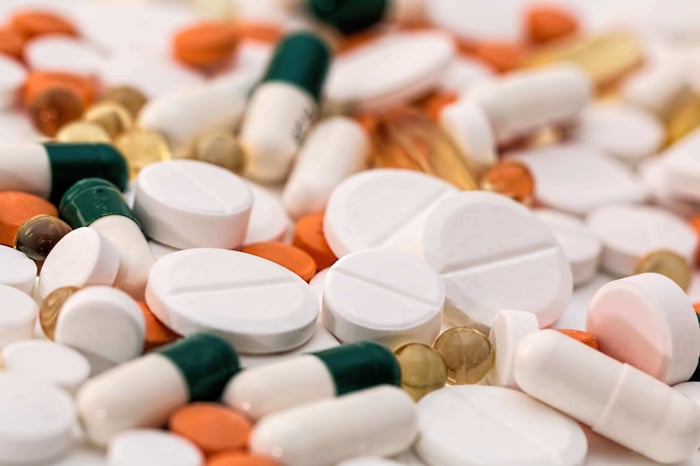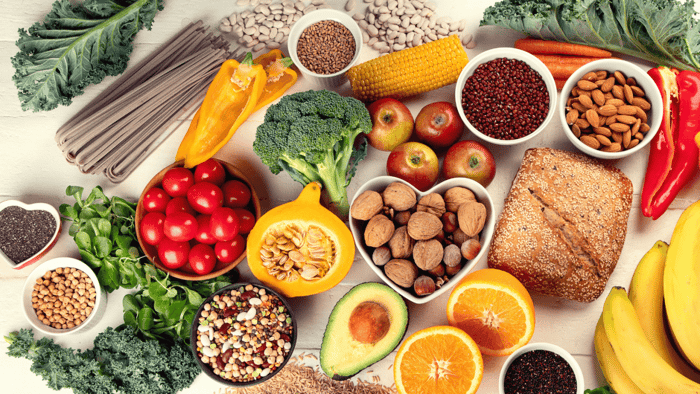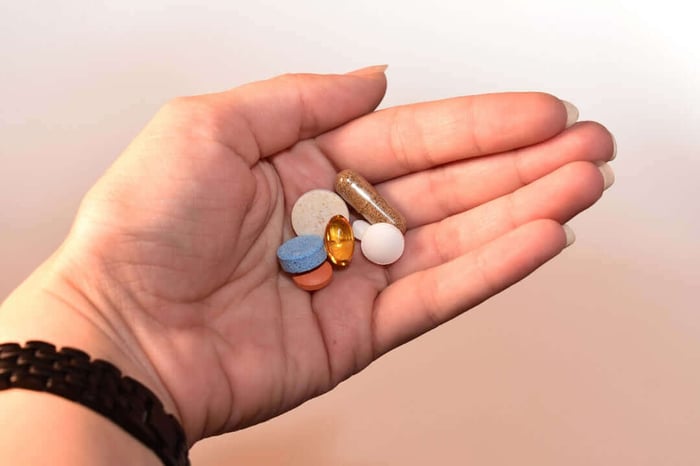What do prebiotics do and why are they actually important? We hear a lot about probiotics, but prebiotics tend to sit in the background. Here’s everything you need to know to decide if you need to take a prebiotic supplement!
Prebiotics are a little more mysterious than their commonplace csins, probiotics. Probiotics are recommended for gut health far more often than prebiotics are, although both prebiotics and probiotics are important for the body.
So let’s dig into prebiotics a little and find out what they are, their relationship to probiotics, and how to tell if you need one or not.
What Are Prebiotics?
Prebiotics are a type of dietary fiber that contribute to the smooth running of your digestive system (1). They’re plant fibers that can’t be made by your body, so you need to get them from outside sources.
They’re also not digestible by the body, but don’t let that put you off! This is a good trait, and you’ll understand why soon.
Fibers have to meet certain criteria to be classified as a prebiotic, according to the Scientific Association for Probiotics and Prebiotics! They should:
- Be resistant to digestive enzymes and stomach acid
- Not be absorbed by the digestive tract
- Be able to be fermented by the microbes in the intestine
- Boost the growth and strength of intestinal bacteria
This means that not all fiber is a prebiotic! Not all prebiotics are fibers, either, but the majority of them are. They can come in natural or synthetic forms (2).
Brand New: The Best (Doctor-Recommended) Probiotic on the Market

What Do Prebiotics Do?
The trillions of live microorganisms in your gut are known as your gut microbiota. They consist of multiple different microorganisms, including both probiotics and prebiotics. In order to understand what prebiotics do, we need to understand their relationship to probiotics.
Probiotics are live bacteria in your gut. They’re responsible for a few important functions in your digestive system, including:
- Maintaining the correct acidity
- Metabolizing food you eat
- Regulating your immune system
- Fighting off harmful bacteria
- Regulating your blood sugar
Prebiotics serve as food for the probiotics in your digestive system. They promote the growth of good bacteria so it can perform the actions listed above.
This is why it’s so important that they’re non-digestible for us! They need to make their way down the digestive tract to where the probiotics are. Here, they ferment and produce short-chain fatty acids, which perform many functions in the gut (3).
That’s why eating both soluble and insoluble fiber is essential. One feeds you, and one feeds the good bacteria in your gut!
How Do Prebiotics Affect You?
Prebiotics make a much bigger difference than you might assume. They’re touted as a gut health helper, but you might be surprised to know that they affect much more than just that!
When we say that prebiotics feed the good bacteria in your gut, that’s their primary purpose. But ultimately, they do much more than just that.
As you can imagine, when the soldiers in your gut are operating at full force, your stomach and intestine health are bound to improve.
Here’s what you can expect when you start taking prebiotics on a regular basis (assuming your probiotics are in check and healthy).
- Regulated bowel movements (4)
- Improved absorption of nutrients (5)
- Feeling fuller for longer (aids with weight loss) (6)
- Boosted immune system (7)
- Reduced inflammation (8)
- Reduced risk of antibiotic-induced diarrhea (9)
- Relief from constipation (10)
- Improved mental health (11)
- Lowered risk of multiple diseases (12)
Prebiotic Food or Prebiotic Supplement?
Prebiotics can be found in both food and supplements. We recommend checking with your doctor if you’re having gastric trouble, rather than just going ahead and grabbing a prebiotic supplement from your pharmacy.
If you take prebiotics supplements when you don’t actually need them, you may be at risk of developing digestive symptoms where you had none before!
You may want to increase your intake of prebiotic foods before you consider a supplement. This is healthy, natural, and tastes better than a supplement!
METABOLISM SUPPORT: Here's What One Doctor Recommends…
Prebiotic Foods
Certain foods are better sources of prebiotics than others. Three of the most common prebiotics are found in resistant starches, pectin (a type of starch in fruits), and inulin (a type of insoluble fiber).
If you want to increase your prebiotic intake without getting a supplement, make sure you include these foods regularly in your diet. Don’t confuse these with fermented foods, which are high in probiotics and still very good for you!
Resistant Starch
Eating these foods provides your gut with digestion-resistant fiber that makes a great meal for your good gut bacteria.
When the bacteria break them down, they give off butyrate. This compound helps the body to absorb water and electrolytes, reduces inflammation, and boosts the immune system.
These foods are high in resistant starch:
- Potatoes (boiled and cooled)
- Unripe bananas
- Oats
- Rice
- Barley
- Beans
- Legumes
Pectin
Pectin is found in various fruits and vegetables. It has excellent benefits, including antioxidant properties and protection against bacterial diseases.
These foods are high in pectin:
- Apples
- Peaches
- Apricots
- Tomatoes
- Green beans
- Carrots
- Potatoes
Inulin
Inulin helps you to feel fuller for longer, and can also stabilize blood sugar, lower bad cholesterol, and boost your gut bacteria’s strength.
These foods are high in inulin:
- Asparagus
- Chicory root
- Dandelion greens
- Jerusalem artichoke
- Onions
- Leeks
- Garlic
Prebiotic Supplements
If you aren’t getting enough prebiotics from your food, your doctor may suggest taking a prebiotic supplement instead.
These are strategically created to fuel the good bacteria in your gut microbiome. You can usually find them over-the-counter. If you’re taking them alone, without a probiotic supplement, you can take your pick of which one looks good to you!
Do Prebiotics Have Side Effects?
If you’ve never taken prebiotics before, ease into it! Bombarding your body with these growth-boosting fibers can have some nasty effects if you take it too quickly, but the good news is that they aren’t permanent.
There are no known negative side effects to taking prebiotics if you take them the right way. If you’re eating more prebiotic-rich food, you may notice that you’re suddenly a bit more gassy than you were before!
You should start with smaller doses of prebiotic supplements to allow your body to ease into it. As you get used to it, you can increase the dosage.
However, the supplement you buy should give explicit instructions on how to use it most effectively and minimize unpleasant side effects.
Must You Take Both Prebiotics and Probiotics?
If you’re taking one but not the other (on the advice of your doctor), you may not need both prebiotic and probiotic supplements.
But it’s worth asking your doctor about taking them together, as there are certain health benefits to doing it that way.
- Probiotic supplements last longer (they’re protected and nourished by the prebiotics on the way to the gut)
- More effective (a larger number of the probiotics make it to the gut)
- Improved mental health (serotonin is produced in the future!)
- Boosted immune system
- Better overall health
If you do want to take them together, there’s a right way to do it and a wrong way to do it. It’s tricky to pair the right prebiotics with the right probiotics.
Just like us humans, certain probiotics prefer certain foods. If you’re pairing a probiotic supplement with a prebiotic it doesn’t like… Well, it’s not going to be that effective.
Your best bet is to choose a supplement known as a synbiotic, which is specially formulated to include the right strains and doses of both prebiotics and probiotics.






